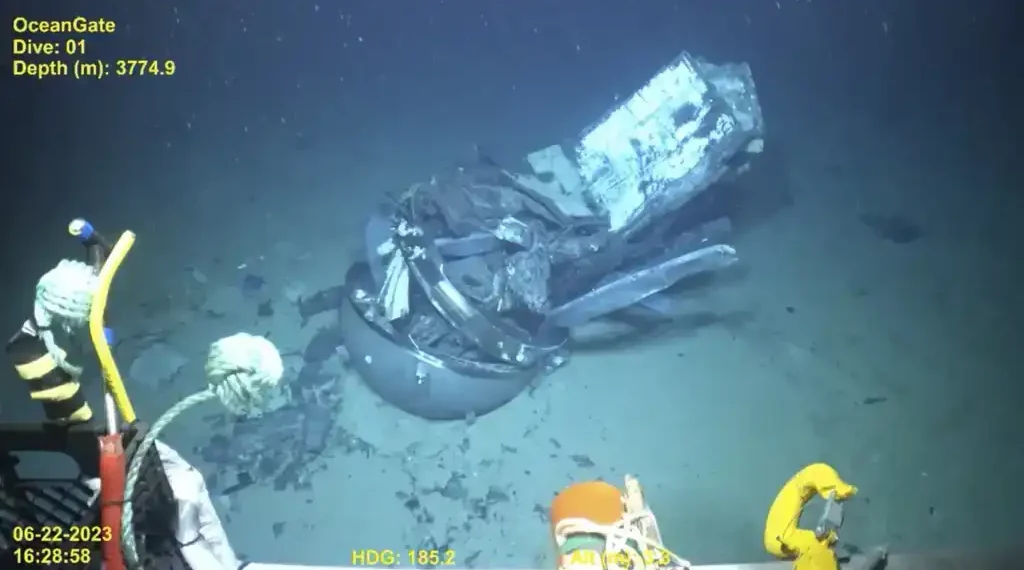Coast Guard Says Titan Submersible Disaster Was Preventable and Could Have Resulted in Criminal Charges
Published: Aug. 6, 2025 — 14:00 U.S. EST
PORTLAND, Maine — The fatal implosion of the Titan submersible in June 2023, which killed five people during a dive to the Titanic wreck, could have been avoided, according to a U.S. Coast Guard report released Tuesday. The investigation found that OceanGate CEO Stockton Rush ignored repeated safety warnings, failed to comply with crucial oversight requirements, and oversaw flawed vessel design and maintenance practices.
Officials concluded that if Rush had survived, the case might have been referred to the U.S. Department of Justice for possible criminal prosecution.
The disaster, which captured international attention during a multi-day search off the coast of Newfoundland, has since prompted calls for tighter regulation of the private deep-sea exploration industry.
Investigation Finds “Critically Flawed” Safety Culture
The Coast Guard determined that OceanGate’s safety procedures fell far short of established maritime standards. Investigators cited “glaring disparities” between documented safety protocols and the company’s actual practices.
Jason Neubauer, chair of the Marine Board of Investigation, said the findings underscore the urgent need for stronger oversight in emerging subsea tourism and research ventures.
“There is a need for stronger oversight and clear options for operators who are exploring new concepts outside of the existing regulatory framework,” Neubauer said.
Experts say the case highlights how gaps in international maritime law allowed OceanGate to operate with minimal oversight. Salvatore Mercogliano, a maritime history professor at Campbell University, noted that private submersible operations often fall into regulatory “gray areas.”
“Unfortunately, almost all maritime regulation is written in blood,” Mercogliano said. “Something had to happen first before changes are made.”
OceanGate suspended operations in July 2023. Spokesperson Christian Hammond confirmed the company had since been wound down and offered condolences to victims’ families.
Warnings Ignored and Safety Concerns Suppressed
The report described a pattern at OceanGate of downplaying or dismissing serious safety concerns. Employees and contractors said they faced threats of dismissal for raising red flags.
Rush, a former aerospace engineer, allegedly reclassified paying passengers as “mission specialists” to bypass small passenger vessel regulations. Several former passengers said they were there purely for the experience, not for scientific research.
In 2017, a Coast Guard Reserve officer hired by OceanGate warned Rush that his planned Titanic dive would violate regulations. According to testimony, Rush responded that “he would buy a congressman” if challenged by authorities.
The investigation also found that Rush submitted fraudulent documents to the Coast Guard, misrepresenting the Titan’s registration, size, and his own maritime service history.
Design and Maintenance Failures
Technical reviews revealed multiple deficiencies in Titan’s design and upkeep. The submersible’s carbon fiber hull — an unconventional choice for deep-sea pressure environments — introduced structural weaknesses that compromised safety.
In 2023, financial constraints led OceanGate to store the vessel outdoors through the Canadian winter, exposing it to temperature fluctuations that further weakened the hull.
The vessel had never undergone full classification or certification by a recognized maritime authority.
The Victims
The implosion killed all five aboard:
- Stockton Rush, CEO of OceanGate.
- Paul-Henri Nargeolet, French Titanic expert and former naval officer.
- Hamish Harding, British explorer and businessman.
- Shahzada Dawood and his son Suleman Dawood, members of a prominent Pakistani family.
In 2024, Nargeolet’s family filed a $50 million lawsuit alleging gross negligence, claiming the victims endured “terror and mental anguish” before their deaths.
Timeline of the Final Dive
Titan had been conducting tourist dives to the Titanic wreck since 2021. Its final expedition began on June 18, 2023, departing from a support vessel positioned about 435 miles (700 kilometers) south of St. John’s, Newfoundland.
The submersible lost contact approximately two hours into its descent. A large-scale, multi-agency search continued for several days under the assumption survivors might still be found.
On June 22, debris from Titan was located about 330 yards (300 meters) from the Titanic’s bow, confirming a catastrophic implosion had occurred.
Industry and Regulatory Impact
The Coast Guard’s findings are expected to influence new safety regulations for private deep-sea expeditions. Maritime experts say future oversight could involve coordinated enforcement between national coast guards, classification societies, and international safety agencies.
While OceanGate no longer operates, the incident has raised questions about the ethics, safety, and regulation of extreme tourism ventures — a rapidly growing sector offering high-priced access to some of the world’s most dangerous environments.
Neubauer emphasized that lessons learned from Titan’s failure must shape industry practices going forward. “This tragedy underscores the price of cutting corners,” he said. “Safety must be the foundation of every mission.”
This article was rewritten by JournosNews.com based on verified reporting from trusted sources. The content has been independently reviewed, fact-checked, and edited for accuracy, neutrality, tone, and global readability in accordance with Google News and AdSense standards.
All opinions, quotes, or statements from contributors, experts, or sourced organizations do not necessarily reflect the views of JournosNews.com. JournosNews.com maintains full editorial independence from any external funders, sponsors, or organizations.
Stay informed with JournosNews.com — your trusted source for verified global reporting and in-depth analysis. Follow us on Google News, BlueSky, and X for real-time updates.














